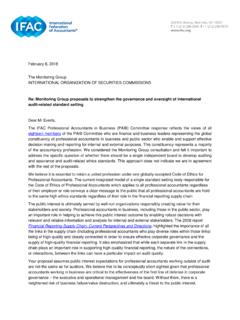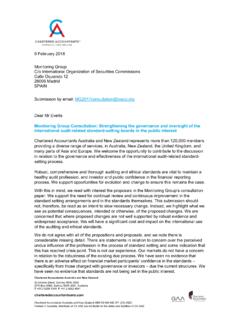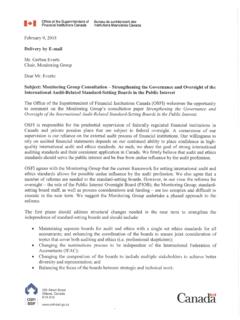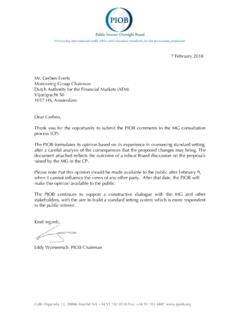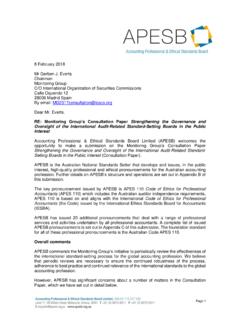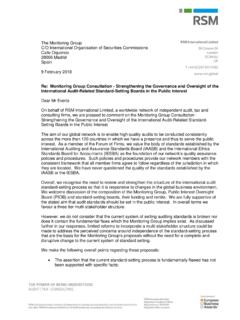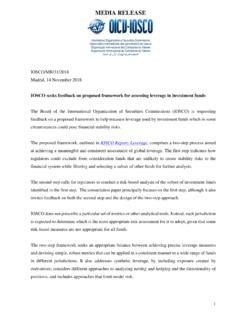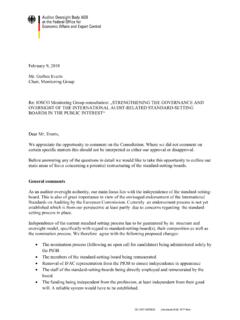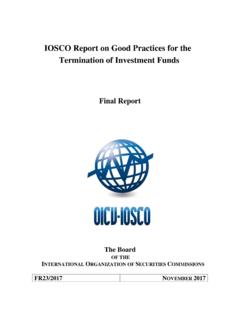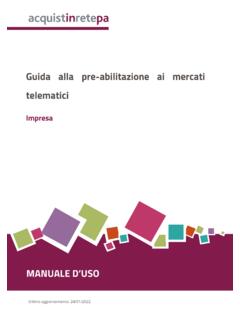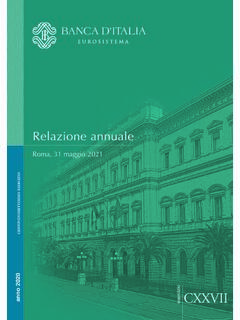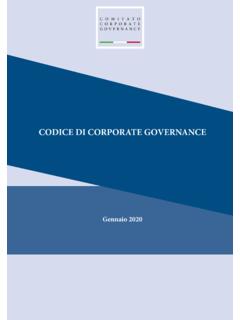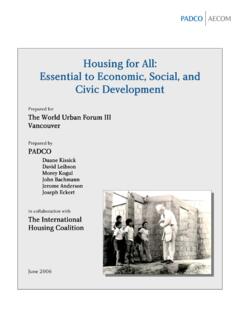Transcription of FR04/2020 Sustainable Finance and the Role of Securities …
1 Sustainable Finance and the Role of Securities Regulators and IOSCO Final Report The Board OF THE INTERNATIONAL ORGANIZATION OF Securities COMMISSIONS FR04/2020 APRIL 2020 ii Copies of publications are available from: The International Organization of Securities Commissions website International Organization of Securities Commissions 2020. All rights reserved. Brief excerpts may be reproduced or translated provided the source is stated. iii Contents Chapter Page 1 Executive Summary 1 2 Introduction 2 Sustainable Finance and the role of the financial system 2 A role for IOSCO 4 About the IOSCO Sustainable Finance Network 6 3 Overview of current initiatives 7 Regulators initiatives on Sustainable Finance in their own jurisdictions 7 Industry initiatives on Sustainable Finance 8 Third-party frameworks and standards 9 4 Results from the SFN survey 16 Survey design 16 Views from the regulators 16 Views from market participants 19 Key takeaways and areas in need of improvement 22 5 IOSCO s continued work within Sustainable Finance 28 IOSCO has a role to play 28 Next steps for IOSCO 29 Appendix 1.
2 Membership of the IOSCO Sustainable Finance Network 30 Appendix 2. Abbreviations 32 Appendix 3. Frameworks and standards included in the desktop survey 33 1 Chapter 1 - Executive Summary Securities regulators share the core objectives of protecting investors, maintaining fair, efficient and transparent markets and reducing systemic risk. Sustainability issues in general, and climate-related issues in particular, can raise important challenges in meeting these core objectives. In October 2018, IOSCO established its Sustainable Finance Network (SFN) to provide a forum for members to exchange experiences and gain a better understanding of, and have structured discussions on, various sustainability issues. The SFN has analysed the context in which Securities regulators are addressing sustainability efforts, the roles they can play and the challenges they may face.
3 In particular, it has focused on Sustainable Finance disclosure issues and their relevance for investor decision- making as well as on the development of industry-led initiatives. To inform its work, the SFN undertook two workstreams. First, it conducted a mapping exercise of initiatives taken or planned by Securities regulators and market participants. Second, it took stock of various international initiatives taken by other regional or international organizations. The work was informed by: (i) a survey conducted in 2019 seeking input from Securities regulators and market participants, (ii) a detailed desktop review of existing standards, third-party frameworks and initiatives, and (iii) engagement with different stakeholders with the view to enhance its understanding of the current state of Sustainable Finance initiatives.
4 This included an international stakeholders meeting held in Stockholm in June 2019. It also built on previous IOSCO work in this area, including the 2019 IOSCO Statement on Disclosure of ESG Matters by Issuers (published in January 2019) and the Growth and Emerging Market Committee report on Sustainable Finance in emerging markets and the role of Securities regulators (published in June 2019). This report provides an overview of current initiatives, both by regulators and the industry, and a detailed analysis of the most relevant ESG-related international initiatives and third-party frameworks and standards. It also identifies a number of areas where improvements can be made and articulates the need for IOSCO to play a key role in this area.
5 For example, the SFN work to date points to a need to improve the comparability of sustainability-related disclosures. The lack of consistency and comparability across third party frameworks could create an obstacle to cross border financial activities and raise investor protection concerns. The Report reflects the expectations from regulators and market participants that IOSCO should take an active role in facilitating global coordination and addressing transparency. It highlights three recurring themes, namely multiple and diverse sustainability frameworks and standards, including sustainability-related disclosure; a lack of common definitions of Sustainable activities; and greenwashing and other challenges to investor protection. To address these challenges, IOSCO has agreed to establish a Board-level Task Force on Sustainable Finance .
6 The aim of the Task Force will be to improve sustainability related disclosures made by issuers and asset managers; to work in collaboration with other international organizations and regulators to avoid duplicative efforts and to enhance coordination of relevant regulatory and supervisory approaches; and to conduct case studies and analyses of transparency, investor protection and other relevant issues within Sustainable Finance . 2 Chapter 2 Introduction 1. Sustainable Finance and the role of the financial system Transitioning to Sustainable development economies and mitigating climate change are major issues around the world. In recent years, there has been an increase in the efforts to promote a more Sustainable development, both within the public and the private sectors, including through financial markets, reflecting a growing recognition of the significant potential economic and financial impacts of climate change and environmental, governance or social-related risks.
7 In the last few years, investment instruments designed to be, or labeled as, Sustainable have reached considerable volumes. According to recent figures, these investments were in the range of 30 to 80 trillion US dollars in 2018, depending on Moreover, a growing number of large global companies report significant exposures to climate-related events, including physical impacts, many of which could potentially materialize within the next five In the longer term, the total volume of stranded assets is likely to increase in a variety of In parallel, the transition to more Sustainable economic models will also present business and investment opportunities. IOSCO s core Principles4 provide for disclosure of material information, and an increasing number of companies are considering and disclosing material risks related to this transition.
8 The financial system can play a role in this transition. It can support the long-term Sustainable development of economies through the intermediation of risks and investments that take into account environmental, social and governance (ESG) ,6 Some jurisdictions are taking policy or regulatory steps to enhance the role of the financial system in the transition towards Sustainable development. From a growth and emerging markets perspective, Sustainable Finance is also identified as an important factor in the development of Sustainable capital markets, helping drive Sustainable growth and 1 Figures from the Global Sustainable Investment Alliance (GSIA) and Principles for Responsible Investments (PRI), respectively. 2 CDP, Global Climate Change Report 2018, July 2019.
9 3 For a description of stranded assets, see P. Bolton, M. Despr s, Pereira Da Silva, F. Samama and R. Svartzman, The Green Swan: Central banking and financial stability in the age of climate change, January 2020. 4 IOSCO Objectives and Principles for Securities Regulation, May 2017. ( ) 5 Environmental, Social and Governance. ESG and sustainability are used interchangeably in this Report, since ESG is an operationalization of the broader concept of sustainability and has become a widely used term within the financial sector. 6 The 2030 Agenda for Sustainable Development has been adopted by all United Nations Member States in 2015, defining 17 Sustainable Development Goals (SDGs). The UN estimates the gap in financing to achieve the Sustainable Development Goals (SDGs) at $ trillion per year in developing countries alone; it is also estimated that achieving the SDGs could open up US$ 12 trillion of market opportunities (see UN Secretary General s 2019-2021 Roadmap for financing the 2030 Agenda for Sustainable Development).
10 The UN Biodiversity Finance Initiative (Biofin) also estimates that the needs of financial flows to protect nature run up to US $ 440bn. 7 IOSCO Growth and Emerging Markets Committee, Sustainable Finance in Emerging Markets and the Role of Securities Regulators, June 2019. 3 Accordingly, Sustainable Finance looks into how Finance (investing and lending) interacts with economic, social, and environmental In other words, Sustainable Finance refers to the process of incorporating ESG factors into financial decision-making. There is not a unique approach towards ESG components among different stakeholder groups, and thus, the approach to disclosure for each component may vary, between industries and between countries. Taking into account these variations, ESG factors ha ve emerged as a key trend in the financial services industry, bringing innovation, raising a number of questions and methodological challenges as well as to business practices and investment strategies.

